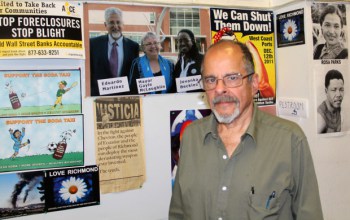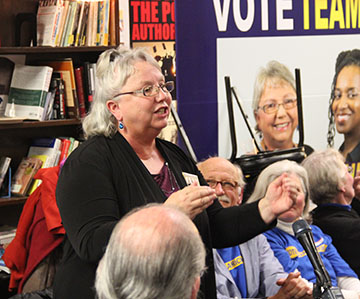by Mike Parker
May 21, 2015
This article is based on a talk given by the author at the recent Future of Left/Independent Politics Electoral Action conference in Chicago, May 2-4, 2015.
Those of us who want to see progressive social change in America view electoral activity not as end by itself, but as an important tool. Electoral activities serve three purposes:
- Effecting change through the government or state. While we understand that government is not truly independent of the strong social forces in our society, it is also possible for a progressive movement to make limited advances by winning government office.
- Educationally using campaigns to get ideas across to the public.
- Increasing consciousness through struggle. We understand that being involved and taking ownership of a struggle opens people’s minds to challenge previously held assumptions and ideas about who are real allies and real enemies, what is needed, and what is possible.

Mike Parker with posters from Richmond Progressive Alliance.
I want to look at the different models that have been discussed at this conference in terms of understanding their strengths and weaknesses with respect to these three uses of the electoral activity tool. These models are, roughly:
- Socialist campaigns like those of Socialist Alternative.
- Green Party Campaigns.
- Local progressive campaigns of alliances of progressive Democrats, Greens, Socialists, Independents in nonpartisan elections like those of the Richmond Progressive Alliance in California.
- Independent individual progressive or left campaigns in non-partisan elections we have heard from in a number of areas, such as aldermanic races in Chicago and many other cities.
What I am not discussing here are campaigns in Democratic Party primaries–a separate although obviously important topic.
Education and “Ownership”
The first use of electoral activity, effecting real change through government, of course depends on winning. Nearly winning, or other pressures that force the winner to adopt some of our issues, are also positive, but nowhere near as good because we see our demands as a start, not as a finished program. It is not so much winning some specific reforms we’re interested in, but whether we are on a path to grow and achieve more significant change.
At the local level it’s clear that it is possible for any of the four types of campaign to win. Kshama Sawant won as an explicit socialist in Seattle; Greens have won in many local races. The RPA defeated Chevron and other forces. While it is probably true that a socialist or Green campaign, all else being equal, might be harder to win than a broad progressive campaign, all else is rarely equal. Many things determine the success of a campaign, especially including having a core of dedicated, committed, well organized campaign workers and a good campaign strategy. Here the socialist and Green campaigns at least start out with a big advantage.
But the different kinds of campaigns are very different when it comes to those aspects of “educating ideas” and “involvement/ownership.” An explicitly socialist campaign has the advantage of being able to put forward a clear program and pose clear alternatives to people. And as we have seen, this might be enough to attract the votes of many people who are fed up with the immediate choices they have been presented. At the same time it is harder for people to take the kind of ownership of the campaign that helps produce major changes of consciousness and commitment unless they are already convinced socialists and opponents of the Democratic Party. (I want to make clear here I am talking about models. Socialist Alternative campaigns have been connected to issues like $15 Now, which provide places for non-socialists to be involved.)
The Green Party’s more limited programs make it easier for a fairly broad range of people to join and take ownership. But it still appears to require people to focus, first and foremost, on party affiliation in order to be strongly involved and take ownership of a campaign. The fact is that most of the people that we have to reach do believe that the Democratic Party is ultimately the only way we will make major changes in government policy. An ironic piece of evidence is that many self-identified Occupy supporters–folks who stood in total opposition to establishment politics–signed on to the Sanders Democratic primary campaign early on.
The RPA Experience
The Richmond Progressive Alliance, which describes itself as containing progressive Democrats, Greens, socialists, and independents, and which successfully challenges in nonpartisan elections, has the advantage of involving people and giving ownership to activists of various causes who continue to believe that significant reform will come through the Democratic Party. While it often draws links to larger national and global struggles, RPA’s campaigns are educationally weaker on the need for overall system change and can only challenge the role of the Democratic Party in a limited way. And the RPA and similar formations will face a major challenge in scaling up to take on state or local partisan elections.
Independent individual campaigns would seem to offer the least value. They stress individuals over on-going organization and issues. These are built around the individual candidate, who usually has the undisputed and final decision on campaign issues. Not only is it hard for movement activists to take ownership of such campaigns, educationally they tend to reinforce one of the most disempowering aspects of American politics: that change will only come when a great individual gives it to us.

Gayle McLaughlin, Richmond Progressive Alliance member and former mayor of Richmond.
Yet individual campaigns may in fact be the place where we have to start in many areas, if the individual candidate understands the role of being a conduit for something far bigger than her/himself. In Richmond, the election of Gayle McLaughlin first as Councilmember, then as Mayor laid the basis for more rank and file community political organization. She and her supporters were clear from the beginning that what they were about representing social movements and building a political opposition. That conception, and the way that McLaughlin worked tirelessly in a principled way as an official, laid the basis for other Richmond candidates and a successful political organization that is operating as a quasi-independent party formation in recent years.
It seems pretty clear that what kind of campaign to run in a local area will be determined by the specific situation, candidates and forces. For now all make a contribution, all empower progressive forces in the United States, and all will be a part of building a national progressive movement that is a contender for national power.
Power is the Real Issue
Finally, a related but somewhat separate note. There are some widely held views on the left that I believe misdirect us. First is exaggerating the importance and power of a full program with a list of fundamental changes that will get us where we need to go: “If we have the right list of demands, voters will support us, people will support our causes. Having a good, comprehensive program is what keeps us from being coopted.”
Related to this is the idea that “program” will be what mobilizes all those people who do not register or do not vote, who are really “our” people. While shifting the dialogue to root causes of problems is essential to peaking people’s interest, the reality is that most of the people who do not vote don’t have a sophisticated analysis of politics. They mainly feel powerless. They are not waiting for us to tell them that things are getting worse, and that greedy companies are the problem. They know that.
Most have had the experience of seeing politicians adopt appealing positions, only to see them slip away. What people who don’t vote really want to know is how they can have some power and make some change for real. Withdrawing from politics is powerlessness combined with defeatism. Voting for a protest candidate is not change. It is powerlessness combined with hope. Sometimes that may be the best we can offer. We will move the large numbers who today don’t vote when we demonstrate that change is possible, that there is a path to power. Si se puede.
Mike Parker is on the Steering committee of the Richmond Progressive Alliance in Richmond, California.
